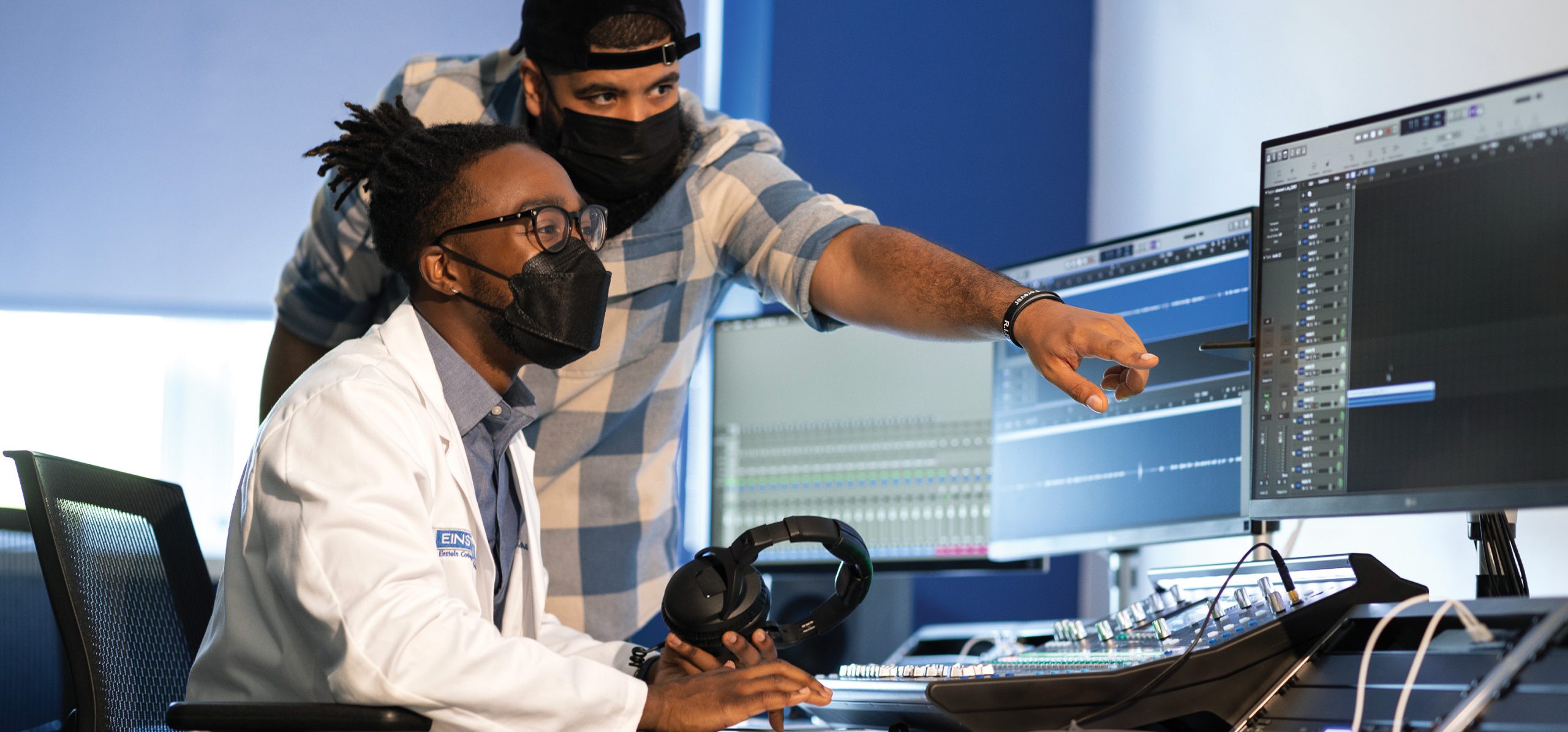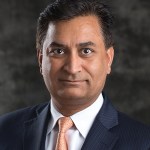
Since September 2021, equipped with just his cell phone and laptop, second-year medical student Justin Olivera has recorded a podcast every two weeks from his Einstein apartment. The episodes—interviews with physicians of color from diverse backgrounds—are intended to inspire the next generation of doctors from groups that are underrepresented in medicine.
Now, thanks to a gift from Amit Patel, M.D. ’88, and his wife, Lisa, Mr. Olivera will soon be able to record his podcasts in a professional studio equipped with two soundproof booths and an advanced mixing and editing station. The Patel Recording Studio, located on the fourth floor of the Van Etten Building, is expected to open later this fall.
The recording studio is the brainchild of Joshua Nosanchuk, M.D., Einstein’s senior associate dean for medical education, who was looking for a way to enhance how educational materials were being delivered to students. “Einstein requires medical students to engage in independent learning in advance of small-group active learning, such as anatomy laboratories and physical-exam practice,” he explains. “High-quality online learning requires on-demand content that engages our learners.”
The new studio will also help the office of medical education produce videos and other effective online learning resources for students, says Dr. Nosanchuk, who is a professor of medicine and of microbiology & immunology at Einstein as well as an infectious-disease clinician at Montefiore. Also, he notes, students will be able to use the studio to practice their presentations, speeches, and thesis and dissertation defenses and to develop e-portfolio materials.
He says that in addition to being employed for curricular activities, the Patel Recording Studio will be used to interview faculty members about their research discoveries, advances in patient care, and developments in community programs.
Dr. Patel says that he hopes the innovative space will encourage creativity and nurture a sense of community on campus. A vascular surgeon at Morristown Medical Center in northern New Jersey, he says he enjoyed his time as an Einstein student and Montefiore resident and wants current students to have good experiences as well.
“Today’s medical students are under many stresses—more so in the era of COVID-19, when so much learning is remote and there’s more social isolation,” he says. “During the first months of the pandemic, my nephew and his fiancée graduated from Einstein and my son was finishing his master’s degree in business administration. We were all at home discussing Einstein and the needs of its students—and I felt motivated to help.”
Those family conversations gave way to discussions with Einstein’s leadership, which led to the creation of the on-
campus recording studio. Its design and construction began in 2021. Besides its purpose as a tool for medical education, the studio will be available to Einstein students, faculty, staff, and alumni to produce superior-quality podcasts, interviews, narrations, voice-overs, speeches, alumni programming, and videos for training and professional development.
A special hope, says Dr. Patel, is that more alumni will see the studio and be inspired to fund similar projects designed to better support Einstein students and enrich campus life.

The podcasts, videos of lectures, and other programming recorded in this studio not only will help today’s students but also will be available to benefit students in the years to come.
— Dr. Amit Patel
The studio fits well with Dr. Patel’s longtime interest in engineering. “My father’s an engineer, and I was always tinkering with things, fixing things,” he says. He enrolled as an engineering major at Rensselaer Polytechnic Institute in Troy, N.Y., but eventually switched to biology. “In a way, medicine was always in the back of my head,” Dr. Patel says.
Dr. Patel’s more than 25 years as a vascular surgeon—diagnosing, managing, and treating diseases of the arteries and veins—has allowed him to take advantage of his aptitude for engineering. “Surgeons are engineers to a degree,” says Dr. Patel. “Vascular surgery in particular involves a fair amount of engineering, from the fluid dynamics to even the equipment. Where engineers might focus on reestablishing water flow, vascular surgeons reestablish blood flow.”
Those combined skills and interests have enabled Dr. Patel to give this valuable gift to the Einstein community. “I especially like the fact that the podcasts, videos of lectures, and other programming recorded in this studio not only will help today’s students but also will be available to benefit students in years to come,” he says.
Meanwhile, Mr. Olivera’s podcast, Med MentoRx, is steadily gaining listeners, and he’s looking forward to recording his second season in the studio. “I’m really excited because the advanced recording technology will allow for high-quality audio and video projects here at Einstein,” he says. “I can’t wait to see how the studio will improve the sound.”
Podcasters and videographers at Einstein—from amateurs to pros—will be able to take their work to the next level at Einstein’s new Patel Recording Studio, which will initially offer audio recording capabilities and later add video options. The studio is currently equipped with two soundproofed recording booths—one that accommodates a single person and another that fits two. People will be able to make audio recordings in three ways:
By bringing in their own laptops to make any audio presentation—narrating a slideshow, for example—sound more professional;
By reading their scripts using a tablet provided by Einstein’s information technology (IT) department to eliminate distracting sounds, such as rustling paper or computer fans;
By taking advantage of the audio and video expertise of the IT department and medical education innovations team.
“The third option allows for a lot more sophistication,” says Shailesh Shenoy, assistant dean for information technology at Einstein. “We can use a control board to capture the recording, filter what’s coming through, and adjust the tone in real time. A lot of processing can be done after you’ve recorded, but the better the recording quality you begin with, the better the end product will be.”